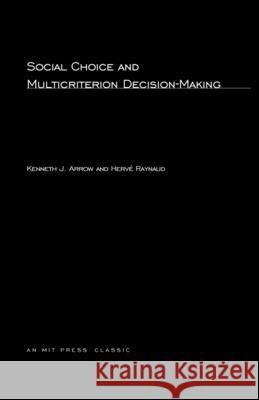Social Choice and Multicriterion Decision-Making » książka
Social Choice and Multicriterion Decision-Making
ISBN-13: 9780262511759 / Angielski / Miękka / 1986 / 128 str.
This study comes to grips with the industrial outranking problem, one of the major outstanding problems of current operations research and managerial decision-making. The problem, simply stated, is this: given a large but finite set of criteria, and a large but finite number of alternatives, how can the criteria be ranked in priority order, and how should the alternatives be ranked from best to worst consistent with the ordering of criteria that may be conflicting or incommensurable?There have been many proposed solutions to the problem. Numerous empirical recipes -- among them the majority method -- have been submitted, based in large part on the subjective judgments and biases of various observers. The authors argue that the axiomatic formulation offers the surest path to a solution that is as objective as possible, minimally distorted by the unwitting imposition of personal values. They then develop a system of consistent and appealing axioms, confront the paradoxes that put axiomatic systems in general at risk, and demonstrate the applicability of their system to realistic industrial outranking problems.Even within the axiomatic framework, however, some leeway remains for subjective choice and conscious value decisions. One ad hoc criterion of choice the authors selected was that their method should be neither so flexible and open that personal biases might easily slip in, nor so artificially rigid that the play of intuition and creativity was systematically excluded. The book also takes a hard look at the theoretical and practical defects of the majority method, the favored proposed solution, and at such associated issues as committee decision techniques, strategic majority voting; and restriction conditions.











